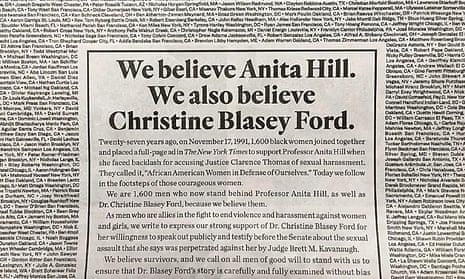A full-page advertisement in Wednesday’s New York Times features the names of 1,600 men with a banner message saying: “We believe Anita Hill. We also believe Christine Blasey Ford,” in a #MeToo era twist on a stand taken 27 years ago.
The crowd-funded ad is an echo of a similar one placed in the same newspaper in 1991, signed by 1,600 women in support of Anita Hill, who was giving her account in a hostile atmosphere on Capitol Hill of sexual harassment she said she suffered while working for Judge Clarence Thomas, who ended up being confirmed to the US supreme court.
On Thursday, Christine Blasey Ford, a professor in California, is due to testify before the Senate judiciary committee in Washington about her allegations that current supreme court nominee Brett Kavanaugh sexually assaulted her when he was 17 and she was 15, in high school.
Wednesday’s ad was organized by a feminist advocacy group called the Phenomenal Woman Action Campaign, named in tribute to the Maya Angelou poem Phenomenal Woman. The group put out a call online for funding over the weekend.
A note accompanying the main message says: “On November 17, 1991, 1,600 black women joined together and placed a full-page ad in the New York Times to support Professor Anita Hill when she faced backlash for accusing Justice Clarence Thomas of sexual harassment … Today we follow in the footsteps of those courageous women.”
Ford came forward by writing first to her local congresswomen in California after Kavanaugh was named on a shortlist of judges to be nominated to the highest court by Donald Trump. She later identified herself publicly in an interview with the Washington Post, and has received a mix of support and – from Republican leaders – growing opposition on Capitol Hill. A second woman has also come forward publicly and a third may reveal herself before the hearing.
The ad continues: “As men who are allies in the fight to end violence and harassment against women and girls, we write to express our full support of Dr Christine Blasey Ford … we believe survivors and we call on all men of good will to stand with us.”
The message criticizes the “skepticism and ridicule” that frequently greet women who speak out, causing many to stay silent. And it demands that Ford’s story “is carefully and fully examined without bias or prejudice”.
At least one similar ad has appeared elsewhere.
The ad in the New York Times is presented in the same style as the one taken out in support of Hill in 1991. The names of the signatories are listed in small print around a central panel with the main message. It goes on to plead for a change in the culture, saying: “For decades, a culture of misogyny has allowed men to act with impunity and without consequence. We demand an end to that culture and we pledge to do our part in dismantling it.”
Attorneys representing Ford have sent to the judiciary committee sworn and signed declarations from four people who corroborate her claims of sexual assault by Kavanaugh, USA Today reported.
Ford alleges that in 1982 Kavanaugh and a friend corralled her into a room at a party and Kavanaugh violently pinned her down and tried to undress her, putting his hand over her mouth when she began screaming. He denies the allegations and has pledged to clear his name on Thursday.
On Wednesday, author Tayari Jones, who wrote the bestselling novel An American Marriage tweeted an image of the 1991 ad, which bore the banner: “African American Women In Defense of Ourselves” and said she had signed it at the time.
She tweeted: “27 years ago, 1600 black women took out a full page ad in the NYT to show support for Anita Hill. I was 20 years old. I put $25 toward the price of the ad and signed my name.”
27 years ago, 1600 black women took out a full page ad in the NYT to show support for Anita Hill. I was 20 years old. I put $25 toward the price of the ad and signed my name. pic.twitter.com/I9AvWsoeGm
— Tayari Jones (@tayari) September 19, 2018
Meanwhile, Anita Hill said the Kavanaugh confirmation hearing – with no FBI investigation and no witness testimony – is destined to be unfair, just as she and many others felt the Thomas hearing was, in an interview with the Associated Press on Tuesday evening.
But she declared optimism for the next wave of the women’s rights movement.
“A lot is different now,” Hill, 62, said of the year since the #MeToo movement against sexual assault and harassment was launched in 2017. “Remember, #MeToo is about raising awareness. Just because the Senate’s awareness hasn’t been raised, doesn’t mean that the rest of us haven’t evolved and learned.”
